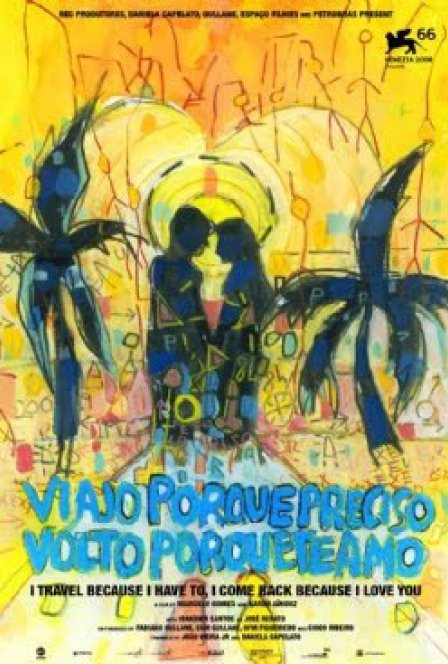Marcelo Gomes and Karim Aïnouz’s film begins with a view of the open road from a moving car windshield, as the narrator, a geologist, reads off a list of objects and materials needed for his work. It isn’t the first time he’ll give us scientifically precise details: he has been sent to scout possible locations for building a water canal through the sertão, an isolated dry region in the northeast of Brazil. Perhaps this will have longterm benefits, but it will certainly displace many of those who live and work where it would be constructed. Only at one point does our narrator question the job he’s been given: “Why build a canal here?” He pauses, then concludes, “not my problem.” We might not forgive him if he didn’t have something more pressing on his mind: his girlfriend just broke up with him. “I take a detour. I need people.”
The present tense reigns in this short but evocative film, which asks a question without explicitly stating it: do our travels and responsibilities define us, or do they get in the way of ourselves? We discern this not only from the faces and occasional voices of workers we see — who take a moment off the job to sing a song, court a lover, or keep pushing their carts through a chiaroscuro street — but also in the impressionistic style of the film itself, which blends fiction and documentary together where one is indistinguishable from the other. By mixing footage shot digitally and on film with still photography, the movie does less to question its own representation of the region than to ensure that all forms of it are valid, despite advancements in technology (and consciousness). “I feel like I’m going nowhere,” our narrator says while a still camera lingers on an azure blue sky. In this film, travel and assemblage are equated with work, but meditation, the prolonged practice of our own subjectivity, is always love.
Our narrator remains unseen as he comments on glimpses of roads, streets, shops, and people, but rarely does he conclude with objective truths. While we watch a woman cut flowers, he addresses “Blondie,” his lost lover, as if there was no past: “She’s a botanist and I’m a geologist… a perfect marriage.” Just as we stand outside what is happening on screen, so does he, allowing us to remain present, participating in the pieces and images of his journey for ourselves. Through creative superimpositions, slowed frame rates, and conceptual cuts, Gomes and Aïnouz suggest the ways in which our memories constantly build upon and bleed into the present moment. In one scene, a prostitute dances for us in a hotel room to thumping music, then the camera cuts to a pack of horses running across an empty road — an uncanny linkage of travel with animalistic behavior. In another extended moment, a barely-moving shot of a church is slowed down and superimposed on top of itself, making it resemble a shimmering postcard.
The personal always trumps the political in this film, allowing travel and love to take on different meanings in different exposures of light; but its lack of intrusion on its subjects defines its purpose. Meandering is the name of the game; though just over an hour long, the film progresses with seemingly little regard for time, as a reference to 29 days left on the road becomes 20 a few minutes later. It is easy, then, to see these events as a series of diversions, spliced together as a movie about a guy who has a problem focusing on his job. Yet (take a deep breath—) I Travel Because I Have To, I Come Back Because I Love You succeeds because it isn’t definitive. It is concerned with ways of seeing in a world that is on the verge of destroying itself. We can’t judge the narrator because we share the same emotions. We can mope or we can take in our environment while it’s there, though our tasks are menial.
The film ends with what seems to be, for me, its most self-consciously aesthetic (and, thus, modern) image, but it depicts a distinct form of movement that the narrator tells us, for him, will be a source of courage. Anybody who can relate to the themes in this film — and that means you — will realize that love and movement have finally reached an understanding.

